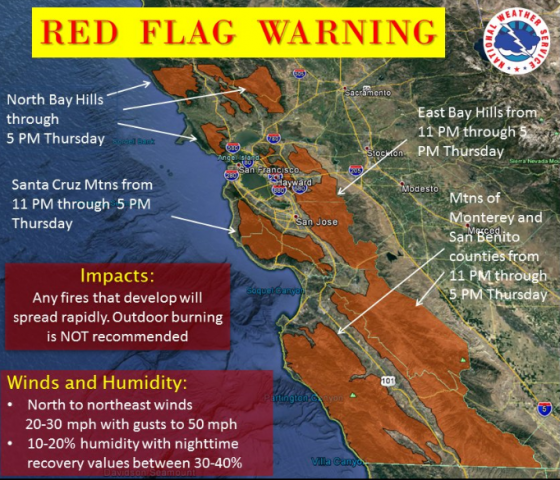
The National Interagency Fire Center (NIFC) increased the National Preparedness Level to 3 today due to wildfire activity in eight Northern California counties, including Napa, Sonoma and Mendocino, where evacuations, road, trail and area closures are in effect. Since their start on the night of Oct. 8, the wildfires in California’s wine country have caused 23 deaths and forced more than 20,000 to evacuate, including the entire city of Calistoga. Additionally, hundreds of residents are missing.
Gov. Jerry Brown declared a state of emergency in Napa, Sonoma and Yuba counties on Oct. 9 and the Presidential Major Disaster Declaration was approved by President Trump on Oct. 10 to support state and local responses. The Governor’s Office of Emergency Services also activated the State Operations Center in Mather, California to its highest level.
The 22 uncontained large wildfires have consumed 170,000 acres in California and destroyed nearly 3,500 commercial and residential properties, many of which were in north Santa Rosa. One major difficulty responders are facing is that several fires have merged into complexes—where two or more individual incidents are located in the same general area—with each complex including an average of five fires.
Causes of the fires have not been determined, although downed power lines due to strong winds were reported on Sunday night, about the time of the first fires. Pacific Gas & Electric Company (PG&E) said its meteorologists measured the inciting gusts at between 50 and 75 miles per hour on Sunday night, which contributed to nearly 20 North Bay fires and “aided the fires in the Northern parts of the energy company’s service area…and damaged PG&E’s electrical system in some locations.”
The National Weather Service issued a wind advisory for North Bay Hills today. Heavy winds have consistently hindered efforts to control and contain the fires, and have been clocked at 20 to 30 miles per hour in the area, with some gusts expected to reach 50 miles per hour. According to CoreLogic’s hazard risk analysis, more than 170,000 homes in Napa and Santa Rosa alone are at some level of structural risk from the fires, with about 6% at significant risk.
Utilities have been affected, as well. Officials told SFGate that water systems in isolated areas of Fountaingrove and Oakmont in Sonoma County have been “compromised,” prompting Santa Rosa police to advise that residents boil tap water used for cooking or drinking. Poor water quality has also become an issue in Napa County.
As reported in Risk Management magazine earlier this month, wildfires in the United States from Jan 1. to Sept. 15 had already burned 8.3 million acres, far exceeding the 10-year average. As of September, the Forest Service and Interior Department had spent more than $2 billion fighting fires this year—making 2017 the most expensive wildfire season on record.
